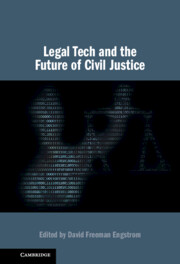
-
- You have access
- Open access
- Cited by 1
-
Cited byCrossref Citations
This Book has been cited by the following publications. This list is generated based on data provided by Crossref.
شهاب الدين إسماعيل, . 2023. العدالة الإجرائية واستخدام التكنولوجيا والذكاء الاصطناعي في الإجراءات عن بُعد والإجراءات عبر الإنترنت. Journal of Law and Emerging Technologies, Vol. 3, Issue. 2, p. 131.
- Publisher:
- Cambridge University Press
- Online publication date:
- February 2023
- Print publication year:
- 2023
- Online ISBN:
- 9781009255301
- Creative Commons:
-
This content is Open Access and distributed under the terms of the Creative Commons Attribution licence CC-BY-NC-ND 4.0 https://creativecommons.org/creativelicenses


